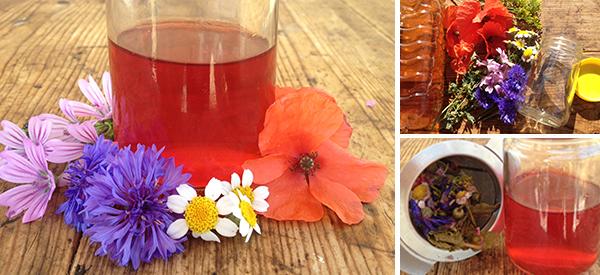
How To Make a Tincture Using Apple Cider Vinegar Instead of Alcohol
Any herb, fruit, nut, root, bark, leaf, or flower can be turned into a tincture. It’s a convenient method of preserving the medicinal properties of your harvest, especially if you have a particularly abundant one. A tincture is one of the best ways to preserve medicinal properties that are heat-sensitive, such as vitamin C and Thiamine (vitamin B1), but there are a number of reasons to substitute the traditional alcohol-based tincture with apple cider vinegar (ACV) and a few of them are outlined below.
Alcohol Versus ACV
Alcohol can disrupt the absorption of thiamine (vitamin B1) and minerals such as zinc, so if you are targeting this vitamin or mineral, you should definitely use ACV instead of alcohol. Certain compounds dissolve better in the water while others such as mucilage, minerals, and polysaccharides don’t dissolve at all in alcohol.
Magnesium requires oxygen to become water-soluble and any compound that contains potassium is also water-soluble so will extract better in ACV compared to alcohol.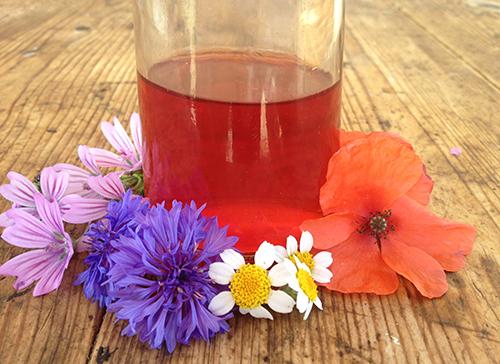
Making a tincture with ACV can be as effective as an alcohol-based one, but it will have a shorter shelf-life due to the higher water content of ACV. ACV is approximately 94% water whereas 40% alcohol has roughly 60% water. This water actually oxidizes vitamins and minerals, so the higher the water content, the more oxidation that occurs which will reduce the potency over time. Any vinegar-based tincture will last 1 – 2 years, whereas an alcohol-based one will last 2 years or more if prepared correctly.
But the higher water content of ACV can also mean that more water-soluble vitamins and minerals can be extracted out of the plant material. These include vitamin C, the vitamin B complex, mucilage, polysaccharides, sugars, and proteins.
Another reason to use ACV instead of alcohol is that it’s safe to use it with children and people with alcohol sensitivities or those who abstain from alcohol.
How to Make an ACV tincture
The method is the same as an alcohol-based tincture and the ratios are pretty much the same:
- Two-thirds of a jar packed with fresh plant material then fill with ACV
- One-third of a jar filled with dried plant material then fill with ACV

These ratios are a guide only. I stuff, ram, and pack the jar two-thirds full of fresh herbs, scrunch up some baking paper to put on top to keep the herbs submerged, and then pour the ACV in until the jar is full.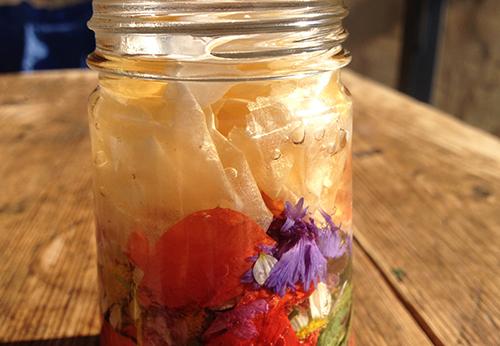
If you are using a jar with a metal lid, make sure to cover the top of the jar with plastic wrap or baking paper before you screw the metal lid on, otherwise, the vinegar will corrode the metal and it will start to rust.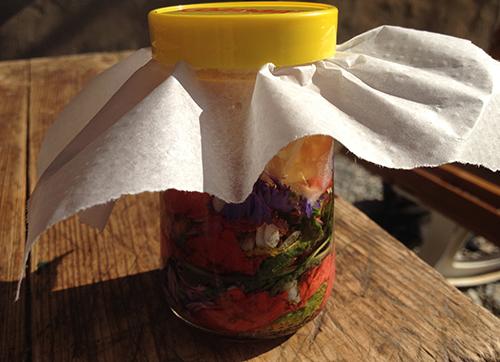
Place your tincture in the fridge for a week and give it a little shake every day. You may need to top up the ACV on day two as the air bubbles rise to the top.
Most compounds are extracted from leaves and flowers after a week and their concentration doesn’t increase significantly after the second week, whereas bark, seeds, and nuts require at least 2 – 6 weeks to extract their medicinal properties.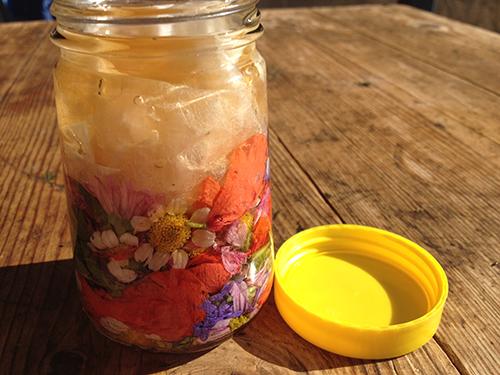
Once your tincture is ready, strain it and store it in a glass jar with a plastic lid (or add a piece of plastic food wrap or baking paper to protect metal lids from corroding).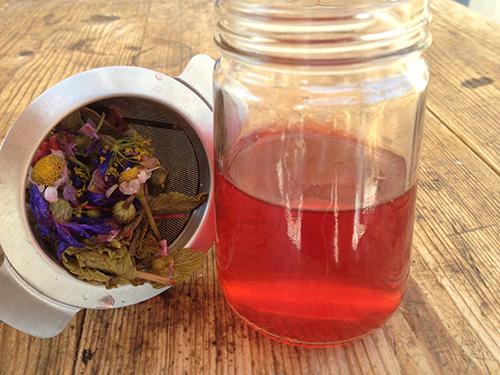
Storage, Usage, and Shelf-life
Store your ACV tincture in the fridge. You can then add it to salad dressings, smoothies, or in just water.
Dosage will depend on what herbs or plants you put in your tincture, but a general rule of thumb is approximately a teaspoon 1 – 3 times a day.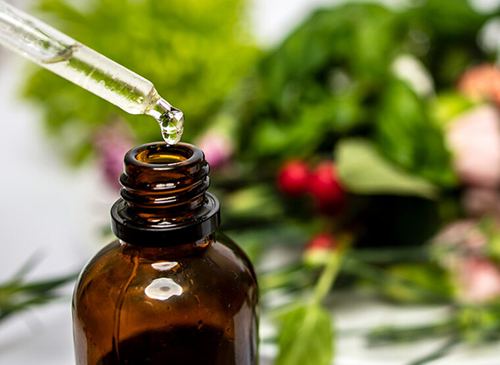
This ACV tincture will last about 1 – 2 years if you have sterilized everything and it’s stored in the fridge or in a dark cool location. If you are using fresh herbs, an ACV tincture will last about a year and if you are using dried herbs, it will last closer to two years.
Plants Suitable for an ACV Tincture
So, next time you have some extra herbs on hand, try whipping up an ACV tincture to preserve their benefits. It’s so easy that you can start preparing a tincture straight away. And to help get things started below is a very brief list of some plants that are relatively high in the medicinal properties that work well in ACV.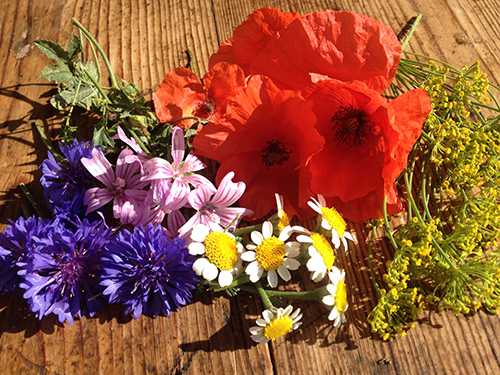
| Plants high in thiamine (vitamin B1) | Plants high in zinc |
| Coriander leaves A wide variety of seeds, especially sunflower seeds A wide variety of nuts A wide variety of beans | A wide variety of seeds such as poppy and cardamon seeds A wide variety of beans A wide variety of nuts |
| Plants high in vitamin C | Plants high in mucilage |
| Thyme Dill Saffron Pepper, paprika, and chili A wide variety of fruit Chestnuts | Marshmallow Burdock root Hibiscus Slippery Elm bark Comfrey roots Irish moss Coltsfoot Indian Gooseberry |
| Plants high in magnesium | Plants high in potassium |
| A wide variety of fruit A wide variety of seeds | Cottonseeds Turmeric Paprika |
So, in summary:
- ACV should be used to extract water-soluble vitamins, sugars, proteins, alkaloids, trace minerals such as zinc, and compound minerals such as forms of magnesium and potassium.
- Avoid using alcohol to extract vitamin C, vitamin B complex, and minerals.
You may also like:
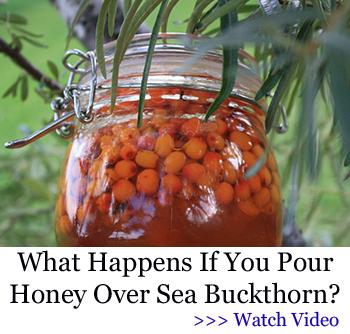 50 Essential Uses of Apple Cider Vinegar
50 Essential Uses of Apple Cider Vinegar
How To Make an Elderflower Probiotic (Video)
How To Make a Cinnamon Painkilling Tincture

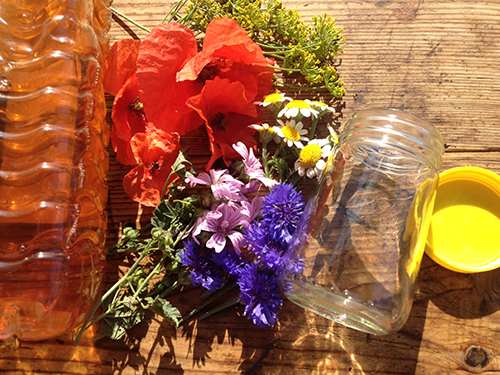
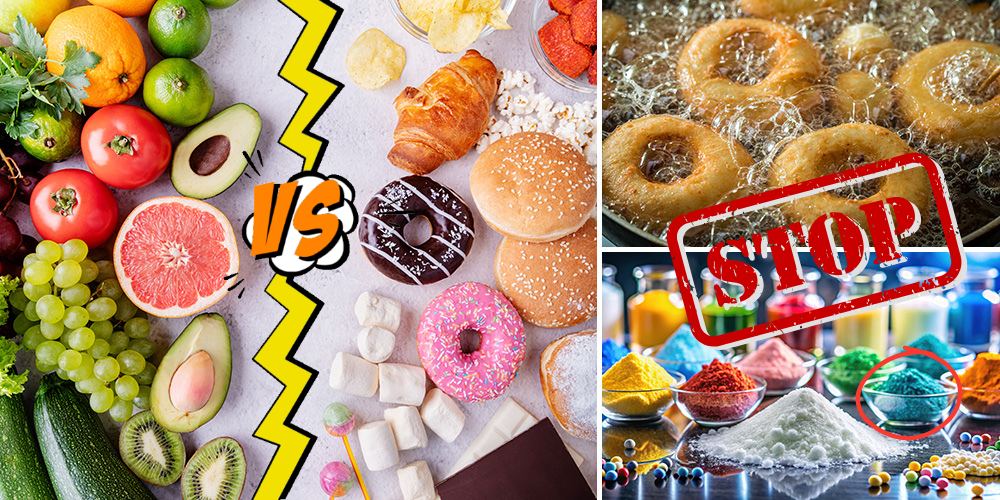
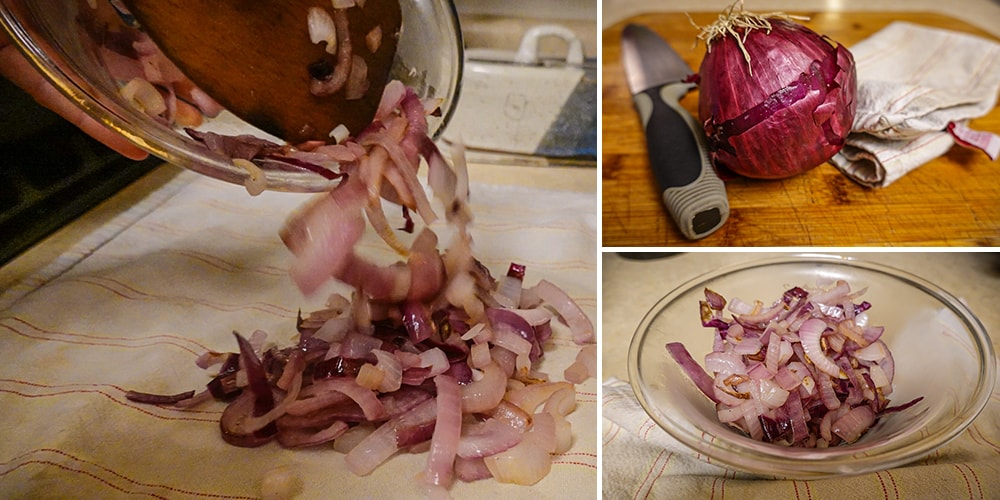
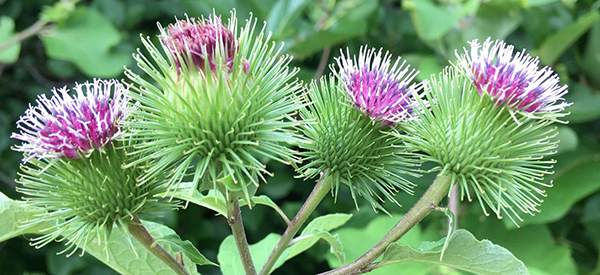
Thank you! I’ve been asking this question under post and on pages and no one has ever replied! I’m sober 17 years and have been wondering if there was a way to make these tinctures w/o alcohol. THANK YOU!
Hi Dawn,
Thank you for your continued support.
We apologize if your question was previously left unanswered.
However, we are glad to hear that this article was exactly what you were looking for.
Many blessings and good health!
I’ve always wanted to make my own herbal tincture, and this is so simple! I wonder about the flavor of the end product. Does it have a flattened down vinegary flavor? Thank you for this excellent website!
Hi Maria,
Thank you for your interest in our work.
The vinegar tinctures have indeed a vinegary flavor. There are people that have no problem with the taste of straight vinegar, but if you are not one of them, you can add some honey I mix with an equal part of honey.
Herbal tinctures with a vinegar base also have a broader range of use than alcohol-based tinctures—so you can use them as a dressing over cooked greens or salads, for example.
Don’t forget to drink some water after taking the tincture and swish your mouth out a bit. Vinegar should not stay against the teeth for long.
Many blessings and good health!
Can you make tinctures out of any herbs???
I was wondering if there was a great alternative to alcohol and vegetable glycerin. This is the best one I’ve seen so far! Thanks so much!
Hi Stephen,
Thank you for choosing us. We’re delighted that you were able to find what you were looking for.
Many blessings and good health!
Can acv be used to make different mushrooms like Chaga and lion’s mane etc?
Hi Troy,
You can make an extract by soaking mushrooms in any type of solvent, including hot water, vinegar or alcohol.
However mushrooms are overflowing with nutrients like polysaccharides, triterpenes and proteins. But these nutrients are locked away behind a tough exterior made from chitin. And while hot water works to draw out some of these nutrients, some compounds need a little more of a kick (alcohol).
Also, depending on the type of mushroom and its compounds, you may only need one extraction method to access all the benefits, but, often a combination is required.
Some mushrooms like cordyceps, turkey tail, lion’s mane, shiitake, tremella and maitake contain sought-after water-soluble compounds.
But, chaga and reishi, some of the most potent medicinal mushrooms, require alcohol to extract non-water-soluble triterpenes and sterols.
I hope this helps. For more info about the Mushroom Tinctures please check out The Lost Book of Herbal Remedies.
That sounds wonderful, Dr. Apelian! We’re definitely going to try making some ACV tinctures! thank-you, 8)
Hi Daniel,
Thank you for your continued support.
Let us know how it goes with the ACV tinctures 🙂
Many blessings and good health!
What is the known cancer fighter that will be destroyed by heat that was referred to in the email teaser?
My question as well. Great minds think alike 😀
I believe they were referring to ACV
Hi,
The ACV tincture is one of the best ways to preserve medicinal properties that are heat-sensitive, such as vitamin C and Thiamine (vitamin B1). Vitamin C is an important antioxidant with anti-inflammatory and immune system enhancement features that could provide protection against cancer.
Many blessings and good health!
This works so wonderfully for people who can’t stand alcohol! Thank you for the recipe!
Im not sure whats happening with my purchased, I hope my book is coming soon.
Thank you
Lena
Hi Lena,
Thank you so much for your interest in our work.
An email has been sent to you reagrding your order. Please check your email address.
Many blessings and good health!
I ordered The Lost Herbs some time ago and need another contact to send money for freight. i haven.t used the online version due to wanting hard copy, thanx
i have received 3 notices you were sendng my book and cd i am still waiting for 2 months
I’m wondering why the ACV tinctures only need to steep for 1 week where the tinctures with alcohol usually say to steep 6-8 weeks. I’m making the Plantain tincture and in the Lost Book of Herbal Remedies it says to steep this (with vodka) for 6-8 weeks. Does the ACV extract more quickly?
Hi
Can I make a ginger tincture with ACV?
Don’t give up on the book, I waited for three weeks, but it’s worth the wait!
What are good tincture for diabetics??
What is a good tincture for diabetics??
Can I use ACV to make tincture of bee propolis?
Thanks for all of the great info you post! I have a question about the vinegar – will regular (cheap) ACV work – or does it need to be a raw, unfiltered, unpasturized type – like Braggs?
I live in the UK and bought the physical book. Recently I watched a video where Nicole shows you how to make a Rosemary tincture w alcohol or ACV. I cannot find this in my book.!? I have also ordered the ebook and many other Lost Herb books,but I was disappointed that the recipes are not in the physical book!
Can you use this method with medicinal mushrooms? (Turkey tail, lions mane, reishi, chaga or even oysters?)
Hi Shannon,
You can make an extract by soaking mushrooms in any type of solvent, including hot water, vinegar or alcohol.
However mushrooms are overflowing with nutrients like polysaccharides, triterpenes and proteins. But these nutrients are locked away behind a tough exterior made from chitin. And while hot water works to draw out some of these nutrients, some compounds need a little more of a kick (alcohol).
Also, depending on the type of mushroom and its compounds, you may only need one extraction method to access all the benefits, but, often a combination is required.
Some mushrooms like cordyceps, turkey tail, lion’s mane, shiitake, tremella, and maitake contain sought-after water-soluble compounds.
But, chaga and reishi, some of the most potent medicinal mushrooms, require alcohol to extract non-water-soluble triterpenes and sterols.
I hope this helps. For more info about the Mushroom Tinctures please check out The Lost Book of Herbal Remedies.
Many blessings and good health!
Can I use ACV to make Ginger Tincture?
Yes you can. Fresh or dried, I use organic ginger root.
I made an ACV extraction with mullein because it is a mucilage extraction, thanks for the info
I just strained my ACV hawthorn tincture and there is something odd in there that looks like the ACV mother grew. Is that possible? It looks good otherwise. No mould or bad smell.